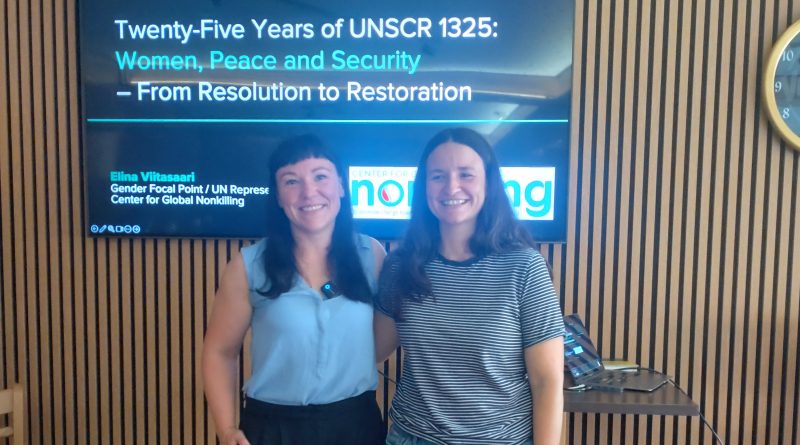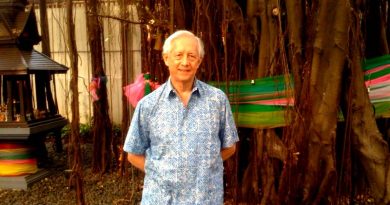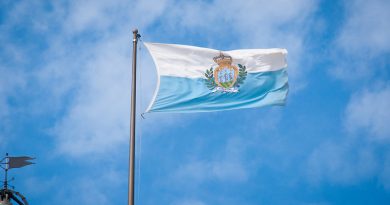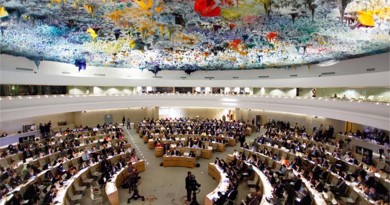From Resolution to Restoration: Nonkilling at the Bosnia Memory in Motion Summit
CGNK proudly served as a co-sponsor of the Memory in Motion: Social Movements and Healing Transgenerational Trauma summit, held August 6–9, 2025, in the mountains of Vlašić, Bosnia and Herzegovina. This women’s gathering, organized by Kolo Women’s Cross Cultural Collaboration (Kolo: WCCC), brought together scholars, activists, survivors, and practitioners from around the world to explore how memory, trauma, and social movements can guide societies from survival to thriving — transforming transgenerational trauma into pathways for healing, justice, and collective well-being.
Elina Viitasaari, CGNK’s UN Gender Focal Point, represented the Centerand delivered a keynote presentation titled “Twenty-Five Years of UNSCR 1325: Women, Peace and Security – From Resolution to Restoration.” In her keynote, Viitasaari revisited the pillars of the Women, Peace and Security (WPS) agenda — Participation, Protection, Prevention, and Relief & Recovery — and asked what a trauma-informed WPS framework truly means in practice. She emphasized that healing is a prerequisite for sustainable peace and that justice must be not only legal but also personal and collective.
“Unprocessed trauma fuels cycles of violence,” Viitasaari noted. “Breaking silence, restoring trust, and supporting recovery are as essential to peace as political agreements or legal accountability. Restoration is justice — and restoration is peace.” Drawing on examples from Bosnia and Herzegovina, Colombia, the Democratic Republic of Congo, and Liberia, her presentation illustrated both progress and persistent gaps between resolution and reality. “The WPS agenda cannot only be about numbers or national action plans,” she said. “It must be about lives — and how those lives are supported to move from survival to agency, and from pain to power.”
A key part of her address reflected on Finland’s intergenerational war trauma — the “price of silence” after the Finnish Civil War and WWII. Viitasaari connected these historical wounds to Finland’s contemporary challenges, such as high suicide and violence rates, showing how unhealed trauma continues to shape societies. Understanding these patterns helps illuminate how nations can transition from post-conflict to post-traumatic growth.
Throughout the summit, participants engaged deeply with the science of epigenetics, examining how trauma — and resilience — can be transmitted across generations biologically, socially, and culturally. The dialogue revealed that while histories differ, the emotional and collective legacies of violence are shared. Healing, therefore, requires truth-telling, remembrance, and solidarity that transcend borders.
A profoundly moving moment of the gathering was the field visit to Ahmići, where participants honored the victims of the 1993 massacre. Standing in silent remembrance with Bosnian war survivors underscored the enduring importance of collective memory, recognition, and moral accountability in the process of societal healing. “Healing is not linear,” Viitasaari reminded in her closing words. “It is slow, painful, and deeply personal — but it is also collective. And it is the foundation of sustainable peace.”
The Center for Global Nonkilling extends deep appreciation to Kolo Women’s Cross Cultural Collaboration for convening such a transformative and interdisciplinary space. The summit’s integration of art, activism, scholarship, and lived experience exemplified the kind of cross-sector collaboration needed to advance cultures of nonkilling and nonviolence.
A book of conference presentations and abstracts will be published for academic and referencing purposes, ensuring that the dialogues initiated at Mt. Vlašić continue to inform research and practice. Additionally, a podcast series based on the summit’s presentations and participants will further share these global perspectives on trauma, healing, and memory.




